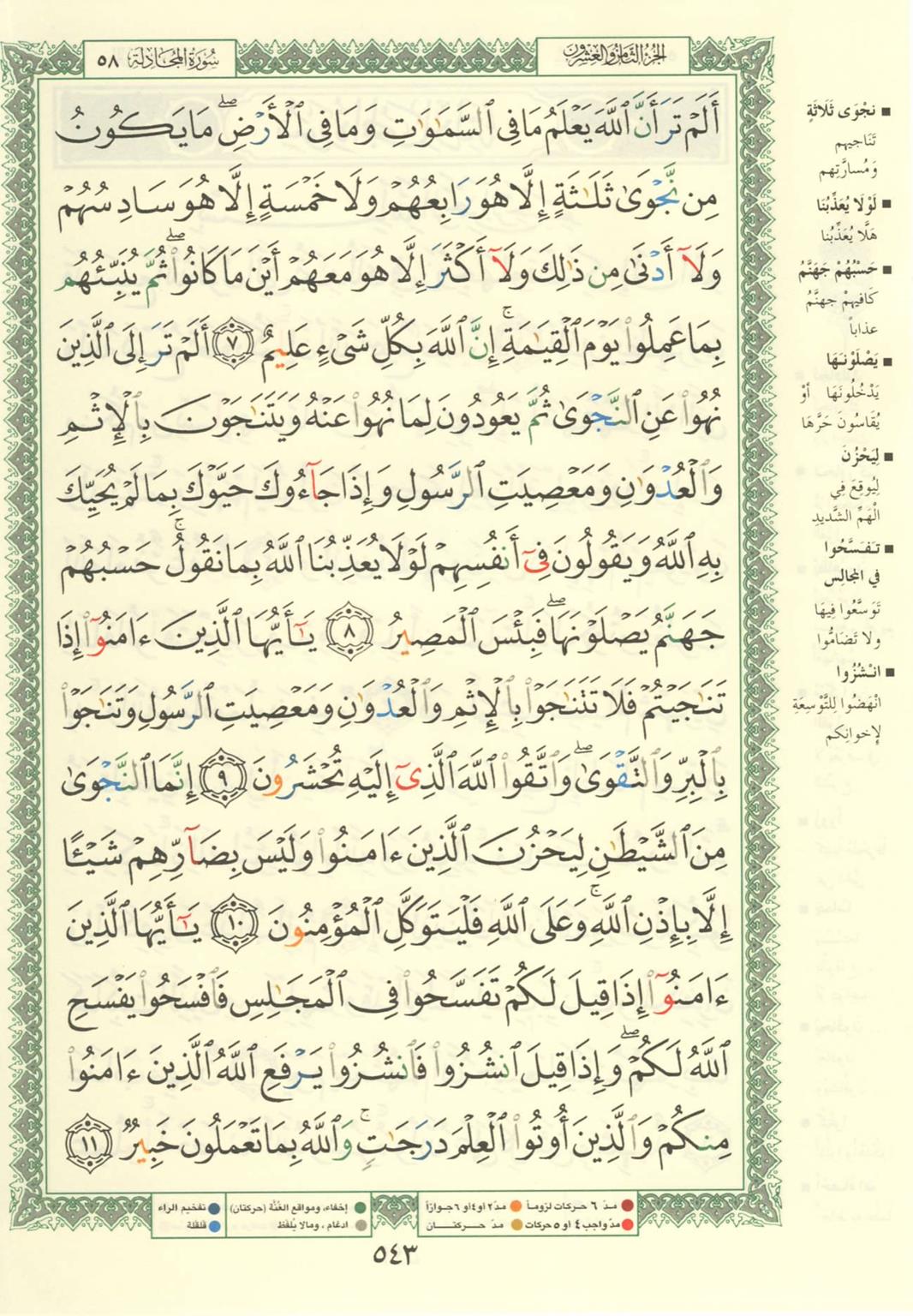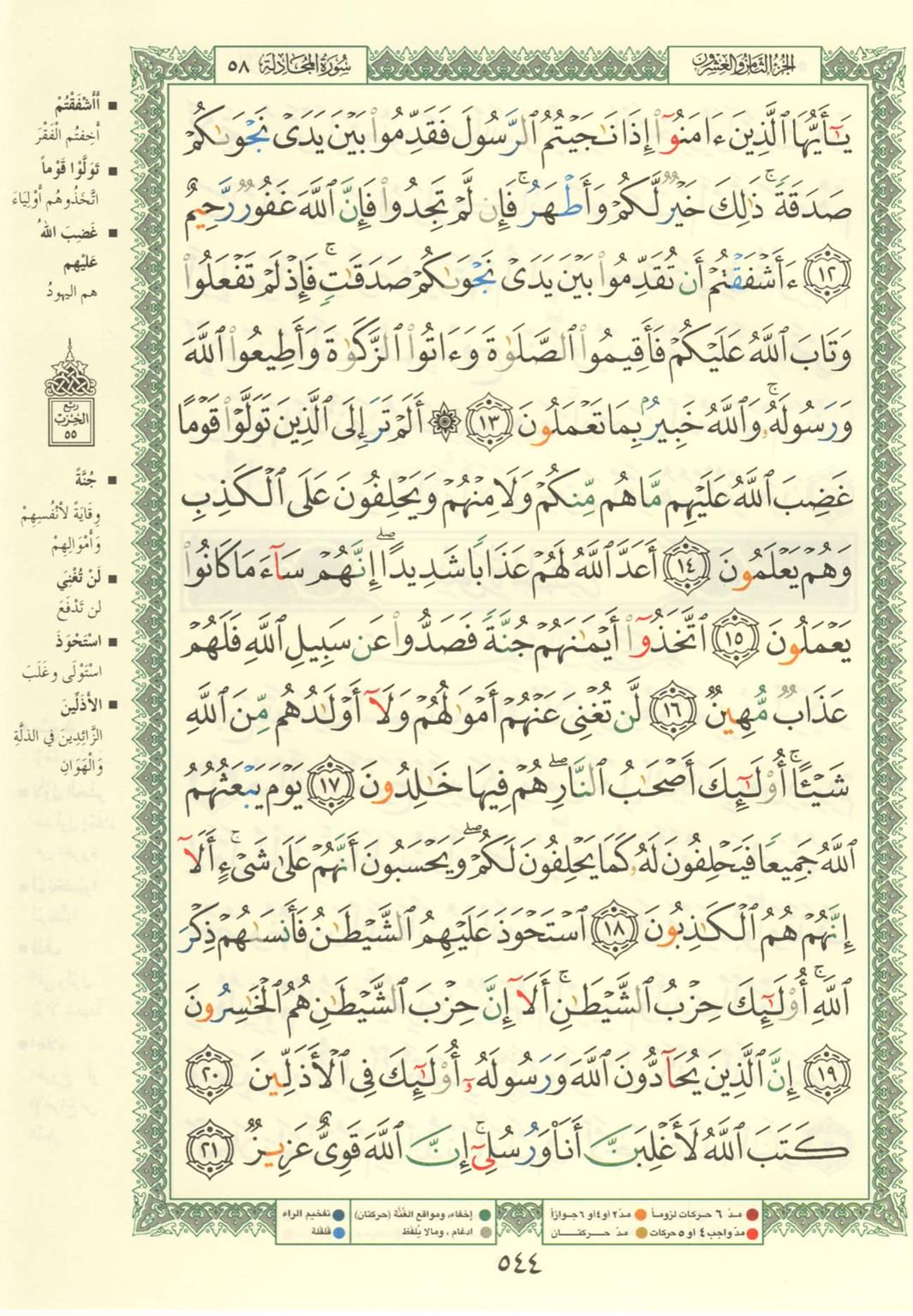Surah Mujadilah
Contents




Page 542
58:1
ق-د
![]() قَدۡ
قَدْ
qad
Indeed,
قَدۡ
قَدْ
qad
Indeed,
س-م-ع
![]() سَمِعَ
سَمِعَ
samiʿa
Allah has heard
سَمِعَ
سَمِعَ
samiʿa
Allah has heard
ا-ل-ه
![]() ٱللَّهُ
اللّٰهُ
l-lahu
Allah has heard
ٱللَّهُ
اللّٰهُ
l-lahu
Allah has heard
ق-و-ل
![]() قَوۡلَ
قَوْلَ
qawla
(the) speech
قَوۡلَ
قَوْلَ
qawla
(the) speech
ا-ل-ل-ت
![]() ٱلَّتِي
الَّتِیْ
allatī
(of one) who
ٱلَّتِي
الَّتِیْ
allatī
(of one) who
ج-د-ل
![]() تُجَٰدِلُكَ
تُجَادِلُكَ
tujādiluka
disputes with you
تُجَٰدِلُكَ
تُجَادِلُكَ
tujādiluka
disputes with you
ف-ي
![]() فِي
فِیْ
fī
concerning
فِي
فِیْ
fī
concerning
ز-و-ج
![]() زَوۡجِهَا
زَوْجِهَا
zawjihā
her husband
زَوۡجِهَا
زَوْجِهَا
zawjihā
her husband
ش-ك-و
![]() وَتَشۡتَكِيٓ
وَتَشْتَكِیْۤ
watashtakī
and she directs her complaint
وَتَشۡتَكِيٓ
وَتَشْتَكِیْۤ
watashtakī
and she directs her complaint
ا-ل-ي
![]() إِلَى
اِلَی
ilā
to
إِلَى
اِلَی
ilā
to
ا-ل-ه
![]() ٱللَّهِ
اللّٰهِ ۖۗ—
l-lahi
Allah.
ٱللَّهِ
اللّٰهِ ۖۗ—
l-lahi
Allah.
ا-ل-ه
![]() وَٱللَّهُ
وَاللّٰهُ
wal-lahu
And Allah
وَٱللَّهُ
وَاللّٰهُ
wal-lahu
And Allah
س-م-ع
![]() يَسۡمَعُ
یَسْمَعُ
yasmaʿu
hears
يَسۡمَعُ
یَسْمَعُ
yasmaʿu
hears
ح-و-ر
![]() تَحَاوُرَكُمَآۚ
تَحَاوُرَكُمَا ؕ—
taḥāwurakumā
(the) dialogue of both of you.
تَحَاوُرَكُمَآۚ
تَحَاوُرَكُمَا ؕ—
taḥāwurakumā
(the) dialogue of both of you.
ا-ن-ن
![]() إِنَّ
اِنَّ
inna
Indeed,
إِنَّ
اِنَّ
inna
Indeed,
ا-ل-ه
![]() ٱللَّهَ
اللّٰهَ
l-laha
Allah
ٱللَّهَ
اللّٰهَ
l-laha
Allah
س-م-ع
![]() سَمِيعُۢ
سَمِیْعٌ
samīʿun
(is) All-Hearer,
سَمِيعُۢ
سَمِیْعٌ
samīʿun
(is) All-Hearer,
ب-ص-ر
![]() بَصِيرٌ
بَصِیْرٌ
baṣīrun
All-Seer.
بَصِيرٌ
بَصِیْرٌ
baṣīrun
All-Seer.
58:2
ا-ل-ل-ذ
![]() ٱلَّذِينَ
اَلَّذِیْنَ
alladhīna
Those who
ٱلَّذِينَ
اَلَّذِیْنَ
alladhīna
Those who
ظ-ه-ر
![]() يُظَٰهِرُونَ
یُظٰهِرُوْنَ
yuẓāhirūna
pronounce zihar
يُظَٰهِرُونَ
یُظٰهِرُوْنَ
yuẓāhirūna
pronounce zihar
م-ن
![]() مِنكُم
مِنْكُمْ
minkum
among you
مِنكُم
مِنْكُمْ
minkum
among you
م-ن
![]() مِّن
مِّنْ
min
[from]
مِّن
مِّنْ
min
[from]
ن-س-و
![]() نِّسَآئِهِم
نِّسَآىِٕهِمْ
nisāihim
(to) their wives,
نِّسَآئِهِم
نِّسَآىِٕهِمْ
nisāihim
(to) their wives,
م-ا
![]() مَّا
مَّا
mā
not
مَّا
مَّا
mā
not
ه-ن
![]() هُنَّ
هُنَّ
hunna
they
هُنَّ
هُنَّ
hunna
they
ا-م-م
![]() أُمَّهَٰتِهِمۡۖ
اُمَّهٰتِهِمْ ؕ—
ummahātihim
(are) their mothers.
أُمَّهَٰتِهِمۡۖ
اُمَّهٰتِهِمْ ؕ—
ummahātihim
(are) their mothers.
ا-ن
![]() إِنۡ
اِنْ
in
Not
إِنۡ
اِنْ
in
Not
ا-م-م
![]() أُمَّهَٰتُهُمۡ
اُمَّهٰتُهُمْ
ummahātuhum
(are) their mothers
أُمَّهَٰتُهُمۡ
اُمَّهٰتُهُمْ
ummahātuhum
(are) their mothers
ا-ل-ل-ا
![]() إِلَّا
اِلَّا
illā
except
إِلَّا
اِلَّا
illā
except
ا-ل-ل
![]() ٱلَّٰٓـِٔي
الّٰٓـِٔیْ
allāī
those who
ٱلَّٰٓـِٔي
الّٰٓـِٔیْ
allāī
those who
و-ل-د
![]() وَلَدۡنَهُمۡۚ
وَلَدْنَهُمْ ؕ—
waladnahum
gave them
وَلَدۡنَهُمۡۚ
وَلَدْنَهُمْ ؕ—
waladnahum
gave them
ا-ن-ن
![]() وَإِنَّهُمۡ
وَاِنَّهُمْ
wa-innahum
And indeed, they
وَإِنَّهُمۡ
وَاِنَّهُمْ
wa-innahum
And indeed, they
ق-و-ل
![]() لَيَقُولُونَ
لَیَقُوْلُوْنَ
layaqūlūna
surely say
لَيَقُولُونَ
لَیَقُوْلُوْنَ
layaqūlūna
surely say
ن-ك-ر
![]() مُنكَرٗا
مُنْكَرًا
munkaran
an evil
مُنكَرٗا
مُنْكَرًا
munkaran
an evil
م-ن
![]() مِّنَ
مِّنَ
mina
[of]
مِّنَ
مِّنَ
mina
[of]
ق-و-ل
![]() ٱلۡقَوۡلِ
الْقَوْلِ
l-qawli
[the] word
ٱلۡقَوۡلِ
الْقَوْلِ
l-qawli
[the] word
ز-و-ر
![]() وَزُورٗاۚ
وَزُوْرًا ؕ—
wazūran
and a lie.
وَزُورٗاۚ
وَزُوْرًا ؕ—
wazūran
and a lie.
ا-ن-ن
![]() وَإِنَّ
وَاِنَّ
wa-inna
But indeed,
وَإِنَّ
وَاِنَّ
wa-inna
But indeed,
ا-ل-ه
![]() ٱللَّهَ
اللّٰهَ
l-laha
Allah
ٱللَّهَ
اللّٰهَ
l-laha
Allah
ع-ف-و
![]() لَعَفُوٌّ
لَعَفُوٌّ
laʿafuwwun
(is) surely, Oft-Pardoning,
لَعَفُوٌّ
لَعَفُوٌّ
laʿafuwwun
(is) surely, Oft-Pardoning,
غ-ف-ر
![]() غَفُورٞ
غَفُوْرٌ
ghafūrun
Oft-Forgiving.
غَفُورٞ
غَفُوْرٌ
ghafūrun
Oft-Forgiving.
58:3
ا-ل-ل-ذ
![]() وَٱلَّذِينَ
وَالَّذِیْنَ
wa-alladhīna
And those who
وَٱلَّذِينَ
وَالَّذِیْنَ
wa-alladhīna
And those who
ظ-ه-ر
![]() يُظَٰهِرُونَ
یُظٰهِرُوْنَ
yuẓāhirūna
pronounce zihar
يُظَٰهِرُونَ
یُظٰهِرُوْنَ
yuẓāhirūna
pronounce zihar
م-ن
![]() مِن
مِنْ
min
[from]
مِن
مِنْ
min
[from]
ن-س-و
![]() نِّسَآئِهِمۡ
نِّسَآىِٕهِمْ
nisāihim
(to) their wives
نِّسَآئِهِمۡ
نِّسَآىِٕهِمْ
nisāihim
(to) their wives
ث-م-م
![]() ثُمَّ
ثُمَّ
thumma
then
ثُمَّ
ثُمَّ
thumma
then
ع-و-د
![]() يَعُودُونَ
یَعُوْدُوْنَ
yaʿūdūna
go back
يَعُودُونَ
یَعُوْدُوْنَ
yaʿūdūna
go back
ل-م-ا
![]() لِمَا
لِمَا
limā
on what
لِمَا
لِمَا
limā
on what
ق-و-ل
![]() قَالُواْ
قَالُوْا
qālū
they said,
قَالُواْ
قَالُوْا
qālū
they said,
ح-ر-ر
![]() فَتَحۡرِيرُ
فَتَحْرِیْرُ
fataḥrīru
then freeing
فَتَحۡرِيرُ
فَتَحْرِیْرُ
fataḥrīru
then freeing
ر-ق-ب
![]() رَقَبَةٖ
رَقَبَةٍ
raqabatin
(of) a slave
رَقَبَةٖ
رَقَبَةٍ
raqabatin
(of) a slave
م-ن
![]() مِّن
مِّنْ
min
before
مِّن
مِّنْ
min
before
ق-ب-ل
![]() قَبۡلِ
قَبْلِ
qabli
before
قَبۡلِ
قَبْلِ
qabli
before
ا-ن
![]() أَن
اَنْ
an
[that]
أَن
اَنْ
an
[that]
م-س-س
![]() يَتَمَآسَّاۚ
یَّتَمَآسَّا ؕ—
yatamāssā
they touch each other.
يَتَمَآسَّاۚ
یَّتَمَآسَّا ؕ—
yatamāssā
they touch each other.
ذ-ل-ك
![]() ذَٰلِكُمۡ
ذٰلِكُمْ
dhālikum
That
ذَٰلِكُمۡ
ذٰلِكُمْ
dhālikum
That
و-ع-ظ
![]() تُوعَظُونَ
تُوْعَظُوْنَ
tūʿaẓūna
you are admonished
تُوعَظُونَ
تُوْعَظُوْنَ
tūʿaẓūna
you are admonished
ب
![]() بِهِۦۚ
بِهٖ ؕ—
bihi
to it.
بِهِۦۚ
بِهٖ ؕ—
bihi
to it.
ا-ل-ه
![]() وَٱللَّهُ
وَاللّٰهُ
wal-lahu
And Allah
وَٱللَّهُ
وَاللّٰهُ
wal-lahu
And Allah
ب-م-ا
![]() بِمَا
بِمَا
bimā
of what
بِمَا
بِمَا
bimā
of what
ع-م-ل
![]() تَعۡمَلُونَ
تَعْمَلُوْنَ
taʿmalūna
you do
تَعۡمَلُونَ
تَعْمَلُوْنَ
taʿmalūna
you do
خ-ب-ر
![]() خَبِيرٞ
خَبِیْرٌ
khabīrun
(is) All-Aware.
خَبِيرٞ
خَبِیْرٌ
khabīrun
(is) All-Aware.
58:4
م-ن
![]() فَمَن
فَمَنْ
faman
Then whoever
فَمَن
فَمَنْ
faman
Then whoever
ل-م
![]() لَّمۡ
لَّمْ
lam
(does) not
لَّمۡ
لَّمْ
lam
(does) not
و-ج-د
![]() يَجِدۡ
یَجِدْ
yajid
find,
يَجِدۡ
یَجِدْ
yajid
find,
ص-و-م
![]() فَصِيَامُ
فَصِیَامُ
faṣiyāmu
then fasting
فَصِيَامُ
فَصِیَامُ
faṣiyāmu
then fasting
ش-ه-ر
![]() شَهۡرَيۡنِ
شَهْرَیْنِ
shahrayni
(for) two months
شَهۡرَيۡنِ
شَهْرَیْنِ
shahrayni
(for) two months
ت-ب-ع
![]() مُتَتَابِعَيۡنِ
مُتَتَابِعَیْنِ
mutatābiʿayni
consecutively
مُتَتَابِعَيۡنِ
مُتَتَابِعَیْنِ
mutatābiʿayni
consecutively
م-ن
![]() مِن
مِنْ
min
before
مِن
مِنْ
min
before
ق-ب-ل
![]() قَبۡلِ
قَبْلِ
qabli
before
قَبۡلِ
قَبْلِ
qabli
before
ا-ن
![]() أَن
اَنْ
an
[that]
أَن
اَنْ
an
[that]
م-س-س
![]() يَتَمَآسَّاۖ
یَّتَمَآسَّا ۚ—
yatamāssā
they both touch each other.
يَتَمَآسَّاۖ
یَّتَمَآسَّا ۚ—
yatamāssā
they both touch each other.
م-ن
![]() فَمَن
فَمَنْ
faman
But (he) who
فَمَن
فَمَنْ
faman
But (he) who
ل-م
![]() لَّمۡ
لَّمْ
lam
not
لَّمۡ
لَّمْ
lam
not
ط-و-ع
![]() يَسۡتَطِعۡ
یَسْتَطِعْ
yastaṭiʿ
is able
يَسۡتَطِعۡ
یَسْتَطِعْ
yastaṭiʿ
is able
ط-ع-م
![]() فَإِطۡعَامُ
فَاِطْعَامُ
fa-iṭ'ʿāmu
then (the) feeding
فَإِطۡعَامُ
فَاِطْعَامُ
fa-iṭ'ʿāmu
then (the) feeding
س-ت-ت
![]() سِتِّينَ
سِتِّیْنَ
sittīna
(of) sixty
سِتِّينَ
سِتِّیْنَ
sittīna
(of) sixty
س-ك-ن
![]() مِسۡكِينٗاۚ
مِسْكِیْنًا ؕ—
mis'kīnan
needy one(s).
مِسۡكِينٗاۚ
مِسْكِیْنًا ؕ—
mis'kīnan
needy one(s).
ذ-ل-ك
![]() ذَٰلِكَ
ذٰلِكَ
dhālika
That -
ذَٰلِكَ
ذٰلِكَ
dhālika
That -
ا-م-ن
![]() لِتُؤۡمِنُواْ
لِتُؤْمِنُوْا
litu'minū
so that you may believe
لِتُؤۡمِنُواْ
لِتُؤْمِنُوْا
litu'minū
so that you may believe
ا-ل-ه
![]() بِٱللَّهِ
بِاللّٰهِ
bil-lahi
in Allah
بِٱللَّهِ
بِاللّٰهِ
bil-lahi
in Allah
ر-س-ل
![]() وَرَسُولِهِۦۚ
وَرَسُوْلِهٖ ؕ—
warasūlihi
and His Messenger,
وَرَسُولِهِۦۚ
وَرَسُوْلِهٖ ؕ—
warasūlihi
and His Messenger,
ت-ل-ك
![]() وَتِلۡكَ
وَتِلْكَ
watil'ka
and these
وَتِلۡكَ
وَتِلْكَ
watil'ka
and these
ح-د-د
![]() حُدُودُ
حُدُوْدُ
ḥudūdu
(are the) limits
حُدُودُ
حُدُوْدُ
ḥudūdu
(are the) limits
ا-ل-ه
![]() ٱللَّهِۗ
اللّٰهِ ؕ—
l-lahi
(of) Allah,
ٱللَّهِۗ
اللّٰهِ ؕ—
l-lahi
(of) Allah,
ك-ف-ر
![]() وَلِلۡكَٰفِرِينَ
وَلِلْكٰفِرِیْنَ
walil'kāfirīna
and for the disbelievers
وَلِلۡكَٰفِرِينَ
وَلِلْكٰفِرِیْنَ
walil'kāfirīna
and for the disbelievers
ع-ذ-ب
![]() عَذَابٌ
عَذَابٌ
ʿadhābun
(is) a punishment
عَذَابٌ
عَذَابٌ
ʿadhābun
(is) a punishment
ا-ل-م
![]() أَلِيمٌ
اَلِیْمٌ
alīmun
painful.
أَلِيمٌ
اَلِیْمٌ
alīmun
painful.
58:5
ا-ن-ن
![]() إِنَّ
اِنَّ
inna
Indeed,
إِنَّ
اِنَّ
inna
Indeed,
ا-ل-ل-ذ
![]() ٱلَّذِينَ
الَّذِیْنَ
alladhīna
those who
ٱلَّذِينَ
الَّذِیْنَ
alladhīna
those who
ح-د-د
![]() يُحَآدُّونَ
یُحَآدُّوْنَ
yuḥāddūna
oppose
يُحَآدُّونَ
یُحَآدُّوْنَ
yuḥāddūna
oppose
ا-ل-ه
![]() ٱللَّهَ
اللّٰهَ
l-laha
Allah
ٱللَّهَ
اللّٰهَ
l-laha
Allah
ر-س-ل
![]() وَرَسُولَهُۥ
وَرَسُوْلَهٗ
warasūlahu
and His Messenger
وَرَسُولَهُۥ
وَرَسُوْلَهٗ
warasūlahu
and His Messenger
ك-ب-ت
![]() كُبِتُواْ
كُبِتُوْا
kubitū
(will) be disgraced
كُبِتُواْ
كُبِتُوْا
kubitū
(will) be disgraced
ك-م-ا
![]() كَمَا
كَمَا
kamā
as
كَمَا
كَمَا
kamā
as
ك-ب-ت
![]() كُبِتَ
كُبِتَ
kubita
were disgraced
كُبِتَ
كُبِتَ
kubita
were disgraced
ا-ل-ل-ذ
![]() ٱلَّذِينَ
الَّذِیْنَ
alladhīna
those
ٱلَّذِينَ
الَّذِیْنَ
alladhīna
those
م-ن
![]() مِن
مِنْ
min
before them.
مِن
مِنْ
min
before them.
ق-ب-ل
![]() قَبۡلِهِمۡۚ
قَبْلِهِمْ
qablihim
before them.
قَبۡلِهِمۡۚ
قَبْلِهِمْ
qablihim
before them.
ق-د
![]() وَقَدۡ
وَقَدْ
waqad
And certainly
وَقَدۡ
وَقَدْ
waqad
And certainly
ن-ز-ل
![]() أَنزَلۡنَآ
اَنْزَلْنَاۤ
anzalnā
We have sent down
أَنزَلۡنَآ
اَنْزَلْنَاۤ
anzalnā
We have sent down
ا-ي-ا
![]() ءَايَٰتِۭ
اٰیٰتٍ
āyātin
Verses
ءَايَٰتِۭ
اٰیٰتٍ
āyātin
Verses
ب-ي-ن
![]() بَيِّنَٰتٖۚ
بَیِّنٰتٍ ؕ—
bayyinātin
clear.
بَيِّنَٰتٖۚ
بَیِّنٰتٍ ؕ—
bayyinātin
clear.
ك-ف-ر
![]() وَلِلۡكَٰفِرِينَ
وَلِلْكٰفِرِیْنَ
walil'kāfirīna
And for the disbelievers
وَلِلۡكَٰفِرِينَ
وَلِلْكٰفِرِیْنَ
walil'kāfirīna
And for the disbelievers
ع-ذ-ب
![]() عَذَابٞ
عَذَابٌ
ʿadhābun
(is) a punishment
عَذَابٞ
عَذَابٌ
ʿadhābun
(is) a punishment
ه-و-ن
![]() مُّهِينٞ
مُّهِیْنٌ
muhīnun
humiliating.
مُّهِينٞ
مُّهِیْنٌ
muhīnun
humiliating.
58:6
ي-و-م
![]() يَوۡمَ
یَوْمَ
yawma
(On the) Day
يَوۡمَ
یَوْمَ
yawma
(On the) Day
ب-ع-ث
![]() يَبۡعَثُهُمُ
یَبْعَثُهُمُ
yabʿathuhumu
(when) Allah will raise them
يَبۡعَثُهُمُ
یَبْعَثُهُمُ
yabʿathuhumu
(when) Allah will raise them
ا-ل-ه
![]() ٱللَّهُ
اللّٰهُ
l-lahu
(when) Allah will raise them
ٱللَّهُ
اللّٰهُ
l-lahu
(when) Allah will raise them
ج-م-ع
![]() جَمِيعٗا
جَمِیْعًا
jamīʿan
all
جَمِيعٗا
جَمِیْعًا
jamīʿan
all
ن-ب-ا
![]() فَيُنَبِّئُهُم
فَیُنَبِّئُهُمْ
fayunabbi-uhum
and inform them
فَيُنَبِّئُهُم
فَیُنَبِّئُهُمْ
fayunabbi-uhum
and inform them
ب-م-ا
![]() بِمَا
بِمَا
bimā
of what
بِمَا
بِمَا
bimā
of what
ع-م-ل
![]() عَمِلُوٓاْۚ
عَمِلُوْا ؕ—
ʿamilū
they did.
عَمِلُوٓاْۚ
عَمِلُوْا ؕ—
ʿamilū
they did.
ح-ص-ي
![]() أَحۡصَىٰهُ
اَحْصٰىهُ
aḥṣāhu
Allah has recorded it
أَحۡصَىٰهُ
اَحْصٰىهُ
aḥṣāhu
Allah has recorded it
ا-ل-ه
![]() ٱللَّهُ
اللّٰهُ
l-lahu
Allah has recorded it
ٱللَّهُ
اللّٰهُ
l-lahu
Allah has recorded it
ن-س-ي
![]() وَنَسُوهُۚ
وَنَسُوْهُ ؕ—
wanasūhu
while they forgot it.
وَنَسُوهُۚ
وَنَسُوْهُ ؕ—
wanasūhu
while they forgot it.
ا-ل-ه
![]() وَٱللَّهُ
وَاللّٰهُ
wal-lahu
And Allah
وَٱللَّهُ
وَاللّٰهُ
wal-lahu
And Allah
ع-ل-ي
![]() عَلَىٰ
عَلٰی
ʿalā
(is) over
عَلَىٰ
عَلٰی
ʿalā
(is) over
ك-ل-ل
![]() كُلِّ
كُلِّ
kulli
all
كُلِّ
كُلِّ
kulli
all
ش-ي-ا
![]() شَيۡءٖ
شَیْءٍ
shayin
things
شَيۡءٖ
شَیْءٍ
shayin
things
ش-ه-د
![]() شَهِيدٌ
شَهِیْدٌ
shahīdun
a Witness.
شَهِيدٌ
شَهِیْدٌ
shahīdun
a Witness.
58:7
ل-م
![]() أَلَمۡ
اَلَمْ
alam
Do not
أَلَمۡ
اَلَمْ
alam
Do not
ر-ا-ي
![]() تَرَ
تَرَ
tara
you see
تَرَ
تَرَ
tara
you see
ا-ن-ن
![]() أَنَّ
اَنَّ
anna
that
أَنَّ
اَنَّ
anna
that
ا-ل-ه
![]() ٱللَّهَ
اللّٰهَ
l-laha
Allah
ٱللَّهَ
اللّٰهَ
l-laha
Allah
ع-ل-م
![]() يَعۡلَمُ
یَعْلَمُ
yaʿlamu
knows
يَعۡلَمُ
یَعْلَمُ
yaʿlamu
knows
م-ا
![]() مَا
مَا
mā
whatever
مَا
مَا
mā
whatever
ف-ي
![]() فِي
فِی
fī
(is) in
فِي
فِی
fī
(is) in
س-م-و
![]() ٱلسَّمَٰوَٰتِ
السَّمٰوٰتِ
s-samāwāti
the heavens
ٱلسَّمَٰوَٰتِ
السَّمٰوٰتِ
s-samāwāti
the heavens
م-ا
![]() وَمَا
وَمَا
wamā
and whatever
وَمَا
وَمَا
wamā
and whatever
ف-ي
![]() فِي
فِی
fī
(is) in
فِي
فِی
fī
(is) in
ا-ر-ض
![]() ٱلۡأَرۡضِۖ
الْاَرْضِ ؕ—
l-arḍi
the earth?
ٱلۡأَرۡضِۖ
الْاَرْضِ ؕ—
l-arḍi
the earth?
م-ا
![]() مَا
مَا
mā
Not
مَا
مَا
mā
Not
ك-و-ن
![]() يَكُونُ
یَكُوْنُ
yakūnu
there is
يَكُونُ
یَكُوْنُ
yakūnu
there is
م-ن
![]() مِن
مِنْ
min
any
مِن
مِنْ
min
any
ن-ج-و
![]() نَّجۡوَىٰ
نَّجْوٰی
najwā
secret counsel
نَّجۡوَىٰ
نَّجْوٰی
najwā
secret counsel
ث-ل-ث
![]() ثَلَٰثَةٍ
ثَلٰثَةٍ
thalāthatin
(of) three
ثَلَٰثَةٍ
ثَلٰثَةٍ
thalāthatin
(of) three
ا-ل-ل-ا
![]() إِلَّا
اِلَّا
illā
but
إِلَّا
اِلَّا
illā
but
ه-و
![]() هُوَ
هُوَ
huwa
He (is)
هُوَ
هُوَ
huwa
He (is)
ر-ب-ع
![]() رَابِعُهُمۡ
رَابِعُهُمْ
rābiʿuhum
(the) fourth of them,
رَابِعُهُمۡ
رَابِعُهُمْ
rābiʿuhum
(the) fourth of them,
ل-ا
![]() وَلَا
وَلَا
walā
and not
وَلَا
وَلَا
walā
and not
خ-م-س
![]() خَمۡسَةٍ
خَمْسَةٍ
khamsatin
five
خَمۡسَةٍ
خَمْسَةٍ
khamsatin
five
ا-ل-ل-ا
![]() إِلَّا
اِلَّا
illā
but
إِلَّا
اِلَّا
illā
but
ه-و
![]() هُوَ
هُوَ
huwa
He (is)
هُوَ
هُوَ
huwa
He (is)
س-د-س
![]() سَادِسُهُمۡ
سَادِسُهُمْ
sādisuhum
(the) sixth of them,
سَادِسُهُمۡ
سَادِسُهُمْ
sādisuhum
(the) sixth of them,
ل-ا
![]() وَلَآ
وَلَاۤ
walā
and not
وَلَآ
وَلَاۤ
walā
and not
د-ن-و
![]() أَدۡنَىٰ
اَدْنٰی
adnā
less
أَدۡنَىٰ
اَدْنٰی
adnā
less
م-ن
![]() مِن
مِنْ
min
than
مِن
مِنْ
min
than
ذ-ل-ك
![]() ذَٰلِكَ
ذٰلِكَ
dhālika
that
ذَٰلِكَ
ذٰلِكَ
dhālika
that
ل-ا
![]() وَلَآ
وَلَاۤ
walā
and not
وَلَآ
وَلَاۤ
walā
and not
ك-ث-ر
![]() أَكۡثَرَ
اَكْثَرَ
akthara
more
أَكۡثَرَ
اَكْثَرَ
akthara
more
ا-ل-ل-ا
![]() إِلَّا
اِلَّا
illā
but
إِلَّا
اِلَّا
illā
but
ه-و
![]() هُوَ
هُوَ
huwa
He
هُوَ
هُوَ
huwa
He
م-ع
![]() مَعَهُمۡ
مَعَهُمْ
maʿahum
(is) with them
مَعَهُمۡ
مَعَهُمْ
maʿahum
(is) with them
ا-ي-ن
![]() أَيۡنَ
اَیْنَ
ayna
wherever
أَيۡنَ
اَیْنَ
ayna
wherever
م-ا
![]() مَا
مَا
mā
wherever
مَا
مَا
mā
wherever
ك-و-ن
![]() كَانُواْۖ
كَانُوْا ۚ—
kānū
they are.
كَانُواْۖ
كَانُوْا ۚ—
kānū
they are.
ث-م-م
![]() ثُمَّ
ثُمَّ
thumma
Then
ثُمَّ
ثُمَّ
thumma
Then
ن-ب-ا
![]() يُنَبِّئُهُم
یُنَبِّئُهُمْ
yunabbi-uhum
He will inform them
يُنَبِّئُهُم
یُنَبِّئُهُمْ
yunabbi-uhum
He will inform them
ب-م-ا
![]() بِمَا
بِمَا
bimā
of what
بِمَا
بِمَا
bimā
of what
ع-م-ل
![]() عَمِلُواْ
عَمِلُوْا
ʿamilū
they did
عَمِلُواْ
عَمِلُوْا
ʿamilū
they did
ي-و-م
![]() يَوۡمَ
یَوْمَ
yawma
(on the) Day
يَوۡمَ
یَوْمَ
yawma
(on the) Day
ق-و-م
![]() ٱلۡقِيَٰمَةِۚ
الْقِیٰمَةِ ؕ—
l-qiyāmati
(of) the Resurrection.
ٱلۡقِيَٰمَةِۚ
الْقِیٰمَةِ ؕ—
l-qiyāmati
(of) the Resurrection.
ا-ن-ن
![]() إِنَّ
اِنَّ
inna
Indeed,
إِنَّ
اِنَّ
inna
Indeed,
ا-ل-ه
![]() ٱللَّهَ
اللّٰهَ
l-laha
Allah
ٱللَّهَ
اللّٰهَ
l-laha
Allah
ك-ل-ل
![]() بِكُلِّ
بِكُلِّ
bikulli
of every
بِكُلِّ
بِكُلِّ
bikulli
of every
ش-ي-ا
![]() شَيۡءٍ
شَیْءٍ
shayin
thing
شَيۡءٍ
شَیْءٍ
shayin
thing
ع-ل-م
![]() عَلِيمٌ
عَلِیْمٌ
ʿalīmun
(is) All-Knower.
عَلِيمٌ
عَلِیْمٌ
ʿalīmun
(is) All-Knower.
58:8
ل-م
![]() أَلَمۡ
اَلَمْ
alam
Do not
أَلَمۡ
اَلَمْ
alam
Do not
ر-ا-ي
![]() تَرَ
تَرَ
tara
you see
تَرَ
تَرَ
tara
you see
ا-ل-ي
![]() إِلَى
اِلَی
ilā
[to]
إِلَى
اِلَی
ilā
[to]
ا-ل-ل-ذ
![]() ٱلَّذِينَ
الَّذِیْنَ
alladhīna
those who
ٱلَّذِينَ
الَّذِیْنَ
alladhīna
those who
ن-ه-ي
![]() نُهُواْ
نُهُوْا
nuhū
were forbidden
نُهُواْ
نُهُوْا
nuhū
were forbidden
ع-ن
![]() عَنِ
عَنِ
ʿani
from
عَنِ
عَنِ
ʿani
from
ن-ج-و
![]() ٱلنَّجۡوَىٰ
النَّجْوٰی
n-najwā
secret counsels,
ٱلنَّجۡوَىٰ
النَّجْوٰی
n-najwā
secret counsels,
ث-م-م
![]() ثُمَّ
ثُمَّ
thumma
then
ثُمَّ
ثُمَّ
thumma
then
ع-و-د
![]() يَعُودُونَ
یَعُوْدُوْنَ
yaʿūdūna
they return
يَعُودُونَ
یَعُوْدُوْنَ
yaʿūdūna
they return
ل-م-ا
![]() لِمَا
لِمَا
limā
to what
لِمَا
لِمَا
limā
to what
ن-ه-ي
![]() نُهُواْ
نُهُوْا
nuhū
they were forbidden
نُهُواْ
نُهُوْا
nuhū
they were forbidden
ع-ن
![]() عَنۡهُ
عَنْهُ
ʿanhu
from [t],
عَنۡهُ
عَنْهُ
ʿanhu
from [t],
ن-ج-و
![]() وَيَتَنَٰجَوۡنَ
وَیَتَنٰجَوْنَ
wayatanājawna
and they hold secret counsels
وَيَتَنَٰجَوۡنَ
وَیَتَنٰجَوْنَ
wayatanājawna
and they hold secret counsels
ا-ث-م
![]() بِٱلۡإِثۡمِ
بِالْاِثْمِ
bil-ith'mi
for sin
بِٱلۡإِثۡمِ
بِالْاِثْمِ
bil-ith'mi
for sin
ع-د-و
![]() وَٱلۡعُدۡوَٰنِ
وَالْعُدْوَانِ
wal-ʿud'wāni
and aggression
وَٱلۡعُدۡوَٰنِ
وَالْعُدْوَانِ
wal-ʿud'wāni
and aggression
ع-ص-ي
![]() وَمَعۡصِيَتِ
وَمَعْصِیَتِ
wamaʿṣiyati
and disobedience
وَمَعۡصِيَتِ
وَمَعْصِیَتِ
wamaʿṣiyati
and disobedience
ر-س-ل
![]() ٱلرَّسُولِۖ
الرَّسُوْلِ ؗ—
r-rasūli
(to) the Messenger?
ٱلرَّسُولِۖ
الرَّسُوْلِ ؗ—
r-rasūli
(to) the Messenger?
ا-ذ-ا
![]() وَإِذَا
وَاِذَا
wa-idhā
And when
وَإِذَا
وَاِذَا
wa-idhā
And when
ج-ي-ا
![]() جَآءُوكَ
جَآءُوْكَ
jāūka
they come to you,
جَآءُوكَ
جَآءُوْكَ
jāūka
they come to you,
ح-ي-ي
![]() حَيَّوۡكَ
حَیَّوْكَ
ḥayyawka
they greet you
حَيَّوۡكَ
حَیَّوْكَ
ḥayyawka
they greet you
ب-م-ا
![]() بِمَا
بِمَا
bimā
with what
بِمَا
بِمَا
bimā
with what
ل-م
![]() لَمۡ
لَمْ
lam
not
لَمۡ
لَمْ
lam
not
ح-ي-ي
![]() يُحَيِّكَ
یُحَیِّكَ
yuḥayyika
greets you
يُحَيِّكَ
یُحَیِّكَ
yuḥayyika
greets you
ب
![]() بِهِ
بِهِ
bihi
therewith
بِهِ
بِهِ
bihi
therewith
ا-ل-ه
![]() ٱللَّهُ
اللّٰهُ ۙ—
l-lahu
Allah,
ٱللَّهُ
اللّٰهُ ۙ—
l-lahu
Allah,
ق-و-ل
![]() وَيَقُولُونَ
وَیَقُوْلُوْنَ
wayaqūlūna
and they say
وَيَقُولُونَ
وَیَقُوْلُوْنَ
wayaqūlūna
and they say
ف-ي
![]() فِيٓ
فِیْۤ
fī
among
فِيٓ
فِیْۤ
fī
among
ن-ف-س
![]() أَنفُسِهِمۡ
اَنْفُسِهِمْ
anfusihim
themselves,
أَنفُسِهِمۡ
اَنْفُسِهِمْ
anfusihim
themselves,
ل-و-ل-ا
![]() لَوۡلَا
لَوْلَا
lawlā
"Why (does) not
لَوۡلَا
لَوْلَا
lawlā
"Why (does) not
ع-ذ-ب
![]() يُعَذِّبُنَا
یُعَذِّبُنَا
yuʿadhibunā
Allah punish us
يُعَذِّبُنَا
یُعَذِّبُنَا
yuʿadhibunā
Allah punish us
ا-ل-ه
![]() ٱللَّهُ
اللّٰهُ
l-lahu
Allah punish us
ٱللَّهُ
اللّٰهُ
l-lahu
Allah punish us
ب-م-ا
![]() بِمَا
بِمَا
bimā
for what
بِمَا
بِمَا
bimā
for what
ق-و-ل
![]() نَقُولُۚ
نَقُوْلُ ؕ—
naqūlu
we say?"
نَقُولُۚ
نَقُوْلُ ؕ—
naqūlu
we say?"
ح-س-ب
![]() حَسۡبُهُمۡ
حَسْبُهُمْ
ḥasbuhum
Sufficient (for) them
حَسۡبُهُمۡ
حَسْبُهُمْ
ḥasbuhum
Sufficient (for) them
ج-ه-ن-م
![]() جَهَنَّمُ
جَهَنَّمُ ۚ—
jahannamu
(is) Hell,
جَهَنَّمُ
جَهَنَّمُ ۚ—
jahannamu
(is) Hell,
ص-ل-ي
![]() يَصۡلَوۡنَهَاۖ
یَصْلَوْنَهَا ۚ—
yaṣlawnahā
they will burn in it
يَصۡلَوۡنَهَاۖ
یَصْلَوْنَهَا ۚ—
yaṣlawnahā
they will burn in it
ب-ا-س
![]() فَبِئۡسَ
فَبِئْسَ
fabi'sa
and worst is
فَبِئۡسَ
فَبِئْسَ
fabi'sa
and worst is
ص-ي-ر
![]() ٱلۡمَصِيرُ
الْمَصِیْرُ
l-maṣīru
the destination.
ٱلۡمَصِيرُ
الْمَصِیْرُ
l-maṣīru
the destination.
58:9
ا-ي-ي
![]() يَٰٓأَيُّهَا
یٰۤاَیُّهَا
yāayyuhā
O you who believe!
يَٰٓأَيُّهَا
یٰۤاَیُّهَا
yāayyuhā
O you who believe!
ا-ل-ل-ذ
![]() ٱلَّذِينَ
الَّذِیْنَ
alladhīna
O you who believe!
ٱلَّذِينَ
الَّذِیْنَ
alladhīna
O you who believe!
ا-م-ن
![]() ءَامَنُوٓاْ
اٰمَنُوْۤا
āmanū
O you who believe!
ءَامَنُوٓاْ
اٰمَنُوْۤا
āmanū
O you who believe!
ا-ذ-ا
![]() إِذَا
اِذَا
idhā
When
إِذَا
اِذَا
idhā
When
ن-ج-و
![]() تَنَٰجَيۡتُمۡ
تَنَاجَیْتُمْ
tanājaytum
you hold secret counsel
تَنَٰجَيۡتُمۡ
تَنَاجَیْتُمْ
tanājaytum
you hold secret counsel
ل-ا
![]() فَلَا
فَلَا
falā
then (do) not
فَلَا
فَلَا
falā
then (do) not
ن-ج-و
![]() تَتَنَٰجَوۡاْ
تَتَنَاجَوْا
tatanājaw
hold secret counsel
تَتَنَٰجَوۡاْ
تَتَنَاجَوْا
tatanājaw
hold secret counsel
ا-ث-م
![]() بِٱلۡإِثۡمِ
بِالْاِثْمِ
bil-ith'mi
for sin
بِٱلۡإِثۡمِ
بِالْاِثْمِ
bil-ith'mi
for sin
ع-د-و
![]() وَٱلۡعُدۡوَٰنِ
وَالْعُدْوَانِ
wal-ʿud'wāni
and aggression
وَٱلۡعُدۡوَٰنِ
وَالْعُدْوَانِ
wal-ʿud'wāni
and aggression
ع-ص-ي
![]() وَمَعۡصِيَتِ
وَمَعْصِیَتِ
wamaʿṣiyati
and disobedience
وَمَعۡصِيَتِ
وَمَعْصِیَتِ
wamaʿṣiyati
and disobedience
ر-س-ل
![]() ٱلرَّسُولِ
الرَّسُوْلِ
r-rasūli
(to) the Messenger,
ٱلرَّسُولِ
الرَّسُوْلِ
r-rasūli
(to) the Messenger,
ن-ج-و
![]() وَتَنَٰجَوۡاْ
وَتَنَاجَوْا
watanājaw
but hold secret counsel
وَتَنَٰجَوۡاْ
وَتَنَاجَوْا
watanājaw
but hold secret counsel
ب-ر-ر
![]() بِٱلۡبِرِّ
بِالْبِرِّ
bil-biri
for righteousness
بِٱلۡبِرِّ
بِالْبِرِّ
bil-biri
for righteousness
و-ق-ي
![]() وَٱلتَّقۡوَىٰۖ
وَالتَّقْوٰی ؕ—
wal-taqwā
and piety.
وَٱلتَّقۡوَىٰۖ
وَالتَّقْوٰی ؕ—
wal-taqwā
and piety.
و-ق-ي
![]() وَٱتَّقُواْ
وَاتَّقُوا
wa-ittaqū
And fear
وَٱتَّقُواْ
وَاتَّقُوا
wa-ittaqū
And fear
ا-ل-ه
![]() ٱللَّهَ
اللّٰهَ
l-laha
Allah,
ٱللَّهَ
اللّٰهَ
l-laha
Allah,
ا-ل-ل-ذ
![]() ٱلَّذِيٓ
الَّذِیْۤ
alladhī
the One Who,
ٱلَّذِيٓ
الَّذِیْۤ
alladhī
the One Who,
ا-ل-ي
![]() إِلَيۡهِ
اِلَیْهِ
ilayhi
to Him
إِلَيۡهِ
اِلَیْهِ
ilayhi
to Him
ح-ش-ر
![]() تُحۡشَرُونَ
تُحْشَرُوْنَ
tuḥ'sharūna
you will be gathered.
تُحۡشَرُونَ
تُحْشَرُوْنَ
tuḥ'sharūna
you will be gathered.
58:10
ا-ن-ن-م
![]() إِنَّمَا
اِنَّمَا
innamā
Only
إِنَّمَا
اِنَّمَا
innamā
Only
ن-ج-و
![]() ٱلنَّجۡوَىٰ
النَّجْوٰی
n-najwā
the secret counsels
ٱلنَّجۡوَىٰ
النَّجْوٰی
n-najwā
the secret counsels
م-ن
![]() مِنَ
مِنَ
mina
(are) from
مِنَ
مِنَ
mina
(are) from
ش-ط-ن
![]() ٱلشَّيۡطَٰنِ
الشَّیْطٰنِ
sh-shayṭāni
the Shaitaan
ٱلشَّيۡطَٰنِ
الشَّیْطٰنِ
sh-shayṭāni
the Shaitaan
ح-ز-ن
![]() لِيَحۡزُنَ
لِیَحْزُنَ
liyaḥzuna
that he may grieve
لِيَحۡزُنَ
لِیَحْزُنَ
liyaḥzuna
that he may grieve
ا-ل-ل-ذ
![]() ٱلَّذِينَ
الَّذِیْنَ
alladhīna
those who
ٱلَّذِينَ
الَّذِیْنَ
alladhīna
those who
ا-م-ن
![]() ءَامَنُواْ
اٰمَنُوْا
āmanū
believe,
ءَامَنُواْ
اٰمَنُوْا
āmanū
believe,
ل-ي-س
![]() وَلَيۡسَ
وَلَیْسَ
walaysa
but not
وَلَيۡسَ
وَلَیْسَ
walaysa
but not
ض-ر-ر
![]() بِضَآرِّهِمۡ
بِضَآرِّهِمْ
biḍārrihim
he (can) harm them
بِضَآرِّهِمۡ
بِضَآرِّهِمْ
biḍārrihim
he (can) harm them
ش-ي-ا
![]() شَيۡـًٔا
شَیْـًٔا
shayan
(in) anything
شَيۡـًٔا
شَیْـًٔا
shayan
(in) anything
ا-ل-ل-ا
![]() إِلَّا
اِلَّا
illā
except
إِلَّا
اِلَّا
illā
except
ا-ذ-ن
![]() بِإِذۡنِ
بِاِذْنِ
bi-idh'ni
by Allah's permission.
بِإِذۡنِ
بِاِذْنِ
bi-idh'ni
by Allah's permission.
ا-ل-ه
![]() ٱللَّهِۚ
اللّٰهِ ؕ—
l-lahi
by Allah's permission.
ٱللَّهِۚ
اللّٰهِ ؕ—
l-lahi
by Allah's permission.
ع-ل-ي
![]() وَعَلَى
وَعَلَی
waʿalā
And upon
وَعَلَى
وَعَلَی
waʿalā
And upon
ا-ل-ه
![]() ٱللَّهِ
اللّٰهِ
l-lahi
Allah
ٱللَّهِ
اللّٰهِ
l-lahi
Allah
و-ك-ل
![]() فَلۡيَتَوَكَّلِ
فَلْیَتَوَكَّلِ
falyatawakkali
let put (their) trust
فَلۡيَتَوَكَّلِ
فَلْیَتَوَكَّلِ
falyatawakkali
let put (their) trust
ا-م-ن
![]() ٱلۡمُؤۡمِنُونَ
الْمُؤْمِنُوْنَ
l-mu'minūna
the believers.
ٱلۡمُؤۡمِنُونَ
الْمُؤْمِنُوْنَ
l-mu'minūna
the believers.

